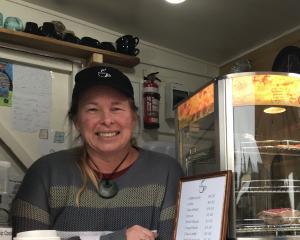
A petition calling for the Government to "initiate a bottle deposit scheme" is to be presented to Parliament before Christmas.
It is an attempt to have New Zealand follow at least 38 other countries, including Canada, Norway and parts of Australia, which operate such schemes.
To demonstrate how it works, the public of Wanaka was invited by Wastebusters on Tuesday to exchange their empty drink containers for cash.
Members of the public handed over empty glass and plastic containers.
Wastebusters handed back 10c for each item.
Wastebusters spokeswoman Gina Dempster said "lots of people remember when we used to earn 10c for recycling a drink bottle or a can, and don’t know why we ever got rid of it".
But those who need to make the decision to bring it back say there is much to consider first. Associate Environment Minister Eugenie Sage said this week a container deposit scheme (CDS) was "one option" for reducing waste and a "serious investigation" of the idea would be carried out.

Ms Sage listed the other options that had to be explored first — improving public place recycling, upgrading kerbside collection services and getting industry to take responsibility "for the environmental impacts of their products and packaging".
She warned "introducing a CDS could affect existing kerbside and commercial recycling collection systems".
"We need to ensure they do not become uneconomic if CDSs are introduced.
"Councils and industry have invested heavily in new infrastructure and services over recent years."
But those councils seem less concerned about the effect than Ms Sage.
Establishing a CDS to "lift recycling rates" was supported by Local Government New Zealand (LGNZ) at its conference in July.
LGNZ represents all 67 affected local authorities.
The Dunedin City Council is one.
It will spend $2.6 million on kerbside recycling in the 2018-19 financial year, and a spokeswoman said this week a CDS "would align" with council policies and councillors were supportive.
The same goes for the Queenstown Lakes District Council which spends $800,000 a year on glass recycling.
A spokeswoman said the council’s recently adopted waste minimisation and management plan "supports the development of an effective container deposit scheme".
The majority of New Zealand’s glass containers come from the 100 members of the Glass Packaging Forum, which includes Emerson’s, Foodstuffs and Nestle.
The forum’s job is to promote the recycling of glass containers, and last year 120,000 tonnes of glass (64% of the glass distributed) was melted down and turned into new glass containers.
Forum manager Dominic Salmon said the target was to reach 84% by 2024, but he offered no opinion on whether the forum supported a CDS.
The forum was "keen to lend its expertise", he said, and it was "happy to be part of the discussions around a container deposit system".
"There is not sufficient quality data information to support or oppose, hence wanting to be part of the conversation," he said.
Mr Salmon pointed out some of the issues that would make a modern CDS different from the previous system.
In the 1960s, the country had many small bottling plants with bottle-washing facilities, but these were all gone, he said.
And the bottles themselves had changed.
"It’s called light weighting. It’s allowed the weight of the bottle to come down so you can fit more on a pallet.
"But that means it’s no longer viable for that bottle to be heat washed. It’s not as strong as it used to be."
A point he made in favour of CDSs was that people saw them as "a nice way of [recycling] because you have a reward for positive behaviour".
"So that’s a conversation we need to have as a country."
But Mr Salmon also made the point about the "considerable investment" in recycling infrastructure made by councils and waste collection companies.
A 52-page analysis done for the Auckland Council last year estimated over a 10-year period New Zealand would be $184 million to $645 million better off if it introduced a CDS.
But the profits of product producers would drop.
"This loss comes about through the increase in price of beverages that attract the deposit leading to lower sales."
The same CDS debate is under way in other countries and surveys show high levels of public support, and less support from industry.
The Guardian newspaper, for instance, reported 78% of Scottish people were in favour but one big soft drink industry player warned of added costs to the consumer, of people "scavenging" in bins and even "cross border trafficking" of deposit-bearing containers.
A former Dunedin schoolboy this week raised another worrying issue.
"We used to pinch empty bottles from the back of the dairy and then march in the front door to claim our reward."
Not surprisingly, he is one of those in favour of a return to the good old days.












